- Home
- Christie Golden
STAR TREK: VOY - Homecoming, Book Two - The Farther Shore Page 6
STAR TREK: VOY - Homecoming, Book Two - The Farther Shore Read online
Page 6
“You and I have something in common.” At her skeptical expression, he added, “We both care about the fate of the Doctor. He’s ... he’s a hero to me. I’ve read your logs and I know that you have come to respect him as a person, with the same rights as organic beings. I don’t know if you’ve heard, but the Federation is [63] planning on deprogramming him and all the other EMH Mark Ones they can get their hands on.”
“I’m aware of that, yes.”
He looked at her closely. “Do you really understand what that means?”
“I do. The Doctor will have only a limited set of basic subroutines. He’ll be little more than an automaton.”
“His love of opera, his writing skills, his affection for the crew he served so well for seven years—all gone. He’ll be a mindless, lumbering—”
“If you’ve got a point, get to it.” Out of the corner of her eye, she saw a light flash on her computer. The trace had failed. Whatever blocking system he had, it was a damn good one.
“I will. Sorry about the trace.” He smiled. “You know that I can’t stand by and let them do that to the Doctor, or the other EMH Mark Ones. Nor, I think, will you.”
“I’m pursuing every avenue I can think of.”
“Including getting Mr. Data to perform as an attorney, I assume. Oh—surprised you again. I’m not superhuman, Admiral. But I have been watching you. It doesn’t take a genius to assume that an android who’s been declared sentient would want to do what he could to save a sentient hologram.”
With respect, Janeway said, “Your talents were wasted on Lynaris Prime.”
The smugness faded. He seemed genuinely pleased when he said, “Thank you, Admiral. I think we could be allies.”
“I don’t ally with terrorists and murderers.”
“The deaths of those people were a tragic accident. All of the bombs were set to detonate when the [64] buildings were supposed to be empty. They are casualties of war, Admiral, and I’m sorry. But steps need to be taken, or there will be more casualties—holographic causalities. I know that you would mourn the deletion of your Doctor as much as you would the death of any flesh person, and because of that, I’m giving you this warning. He leaned forward into the viewscreen, his eyes intense. “We are planning to liberate the Doctor.”
“How?”
“There are many at the prison site who are not flesh beings anymore. I’ve replaced key personnel with holographic doppelgängers.”
“But how can—”
“Your Doctor is no longer the only hologram with a portable emitter. Mine aren’t quite as sophisticated, but they will do.”
So the Doctor had been right. B aines had been able to create a portable emitter for his holograms.
“Don’t think about warning anyone,” Baines continued. “I’m going to put my plan into action the minute we terminate this conversation. I didn’t know your timetable, if any, for any rescue you might be planning. It’s my understanding that you have three friends in that prison. I didn’t want you to get hurt if by chance you were ... involved.”
“You don’t seem to care much about human life,” Janeway said.
“That’s not true! I only—”
“Why are you warning me?”
“As I said, we could be allies. At the very least, the old adage applies—the enemy of my enemy is my [65] friend. We’re more alike than different. You are one of the few organics in any position of power who understands what I’m fighting for.”
Chakotay had remained utterly silent and immobile. Neither he nor Janeway wanted Baines to know that anyone else was overhearing this conversation. She felt his eyes on her but didn’t give him away by even glancing quickly in his direction.
This was no short warning. Baines was sincere, at least in part—he did want her as an ally. He wanted to talk. A thought flickered in her mind. Perhaps she could take this opportunity and dissuade him. After all, he was right—they shared a common goal, although they were worlds apart on how to achieve that goal.
“You’re right, Mr. Baines,” she said smoothly. “I want the Doctor whole and unharmed. I have no desire to see the other EMHs’ potential so degraded. I do think there should be rights granted to holograms.”
His body posture softened slightly. “Yes,” he said, “Yes, I knew you would understand.”
“You and the Doctor had a brief conversation, is that correct?”
“Yes, and for that he was sent to prison. Which is why I must ensure that he is freed before they do this terrible thing to him!”
“The Doctor told me that he tried to dissuade you from violence.”
“He did. And I listened to him. A strike isn’t violent. I did nothing to interfere with any EMHs or any holograms that were in a position to save lives.”
He desperately wanted credit for what he’d done right, Janeway thought. Almost like a child.
[66] “You did. But—”
“And I told you, the bombs weren’t supposed—”
“But they did, Mr. Baines. They did kill people. You made that decision to destroy property and took some innocent lives right along with it. You’ve got to live with that choice, but you also have the chance to not make things any worse. You say this attack on the complex where the Doctor is being held is going to be violent. That’s escalating things from accidental deaths to deliberate deaths. No one is going to listen to you if you do that. No one is going to believe you’re on the side of the angels if you start piling up corpses in your wake.”
He stared at her, stunned at the frankness of her speech. Out of the corner of her eye she saw Chakotay start smiling. He knew where she was going with this.
“I think the Doctor is very wise, Mr. Baines, and the advice he gave you was excellent. Slaves in the 1800s would never have been freed if the people in power at the time had not realized the injustice of their ways and pushed to end a dreadful institution. A hundred years later, the Civil Rights movement would have been a failure if it had only been African Americans protesting discrimination. And violence against women would not have ended had not men worked alongside women to make it stop. It’s fine for the holograms to stand up for their rights, and they should. But if you keep pushing this, those of us who are actually on your side are going to be forced to turn against you and decry what you are doing.”
“But how can I make them see?” he cried, his voice breaking. If nothing else, Baines was no cynic. It was obvious he cared passionately about his holographic friends.
[67] “You lived with the Doctor for seven years. You had a chance to see him rise above what he was designed for, to learn to like him as a person. Everyone else thinks of holograms as slaves or servants, not people. How can I make them understand without something being at stake if they don’t?”
“It seems to me that the Doctor did a fine job of conveying what it was like to be a hologram, destined to be at the beck and call of his creators,” said Janeway. “His holonovel really made the reader feel the humiliation, the fear. He got that information across clearly and profoundly, with not so much as a scratch. Don’t underestimate the power of words, Mr. Baines. You don’t always need to hurt people to get their attention.”
He had seemed to be listening, but now he was shaking his head. “Your way will take too long,” he said flatly. “Too many will be taken off-line, or reprogrammed. I can’t afford to wait.”
“Maybe you won’t have to.”
He looked at her suspiciously, but said, “I’m listening.”
Janeway made her decision. It was all or nothing now.
“I’ll admit it. We were planning a jailbreak of our own to free Seven, Icheb, and the Doctor, all of whom are in what I believe to be immediate danger. I can’t afford to wait, either. You can help us, if you will. Help us to buy some time and minimize loss of life.”
Baines snorted. “It’s a trap. I’m not an idiot, Admiral.”
She shook her head, aware that Chakotay was staring at her. Apparently, he hadn’t known where she wa
s going with this.
“No trap, Mr. Baines. I give you my word. If you [68] assist us, I promise you will have a chance to talk to the Doctor within a few hours of his liberation.”
He shook his head so violently his hair flew. “No. I don’t trust you. You’ll betray me. The Doctor will never be free if I—”
“How dare you!” The words cracked like an old-fashioned pistol shot. Even Chakotay started, and Baines shut his mouth so quickly that his teeth snapped together. Janeway rarely gave in to her emotions so freely, but she couldn’t help it and frankly didn’t want to.
“How dare you!” she repeated. “You say you understand the depth of feeling I have for the Doctor. If that’s true, how can you accuse me of sitting here worrying about setting a trap for you when they’re about to destroy him? He’s an icon to you, a symbol of your revolution, a tool. But he’s a hell of a lot more than that to me. He’s my friend. I’ll die before I let them harm him, Mr. Baines, and if you believe nothing else I say, then you’d damn well better believe that.”
They stared at one another for a long moment. Finally, Baines spoke.
“I do believe that, Admiral. And I will help you in any way I can.”
Chapter 6
THE RAIN WAS surprisingly cold.
B’Elanna huddled miserably under what little shelter she had been able to find, a cluster of enormous leaves close to the ground. She was grateful for her new “clothes,” although the skin she’d been able to get from the grikshak still smelled of carrion and her flesh cringed from the moist underside where it touched her. But, beggars couldn’t be choosers.
“You know, Mother,” she said aloud, just to hear her own voice, “we could have had a nice, traditional reunion in some pleasant café over a cup of coffee.”
The soft, seemingly endless patter of rain was her only answer.
Even had her mother not decided to play this potentially deadly game of hide-and-seek with her only offspring, Torres knew that Miral wouldn’t be caught dead [70] in a pleasant café. No, if they weren’t here in this miserable wet wilderness, they’d be knocking back mugs of bloodwine and singing loud, grating Klingon songs. Maybe this was better.
She didn’t want to admit it, but a part of her—a very small part—was enjoying this. B’Elanna had always thrived on pushing her own limits. She dove on every engineering challenge with gusto that would have pleased Kahless himself. She couldn’t count the hours she had lain awake in bed, in recent years with Tom snoring softly beside her, staring at the ceiling while her mind chewed on one problem or another. Her desire to excel, to make a difference, had driven her all her life. But Torres had never really thought about it too much.
Except now, she had a lot of time on her hands with often nothing to do but think. And she wasn’t necessarily happy with what she saw floating to the top of her consciousness.
Why had she been so driven? It was easy to lay the blame on her parents, but that was not really the whole story. Her mother had pushed B’Elanna into Klingon culture with too much enthusiasm and too little preparation for it. Everything she had done had been done full tilt, with lots of yelling and broad gestures. Her quiet father had not been able to compete. B’Elanna still hadn’t had a chance to talk to him, to ask him, as one adult to another, what had really transpired between him and Miral. That had been one of the things she had wanted to do, but she hadn’t expected this, hadn’t expected her mother to throw still one more impossible challenge at her half-human [71] daughter, hadn’t expected to be sitting naked but for a dead animal skin alone in the wilderness while cold rain sluiced down—
Torres wiped at a face that was wet with more than raindrops.
This was no game. This was no stint in a monastery, or lecture, or four-hour excursion to sit, bored to death, at a performance of Klingon opera. This was very real, was very deadly, and Miral had done this for a reason.
Torres reviewed her time on the Barge of the Dead. Even now, her heart sped up at the recollection. What a terrifying experience that had been. All her repressed memories of Klingon myth and legend had shot to the surface, with sharp teeth, sharp weapons, and sharp, painful memories of failure and disappointments.
She’d done what she’d needed to, in the misty realm of whatever it had been—spirit, shared dreaming, subconscious. And beyond all the logic with which the very pragmatic B’Elanna Torres understood, somehow Miral had known about it.
“But that wasn’t enough for you, Mother, was it?” she said, again speaking aloud. “I couldn’t just save you in the spirit world, I had to come here and do it all over again in the material world. How many times do I have to prove myself worthy to you?”
And the answer came almost like a physical blow inside her skull: Until you believe it yourself.
She laughed, shakily, more unsettled than amused by the forceful revelation. “Well,” she said, “that could take forever.”
But even as she said it, she knew it had better not. It had been fine to be the sullen rebel, the wild child, [72] when it was only herself who stood to lose. But things had changed. Now, there were others. Her mother, stubbornly ensconced in the wilderness until Torres came to find her. Her father, who so clearly wanted to make things right again, if he could. And her own, immediate family: Tom, whom she loved more than she hated herself, and her beautiful, perfect daughter, named for her grandmother. Their fates all hinged on what B’Elanna did this moment, this hour, this day, this month. It was a weight she never thought she’d have to carry, but she found the burden a sweet one.
She was so lost in reverie that she didn’t noticed the rain slowing down until it had almost completely stopped. She blinked as the dark green light of the jungle shifted slowly to brighter hues, and the steady, soothing rhythm of the rain gave way to first silence, then the tentative calling of birds and animals.
She crawled out from under her shelter of leaves and her hand immediately sank wrist-deep in mud. Only a few days ago that would have produced a snort of disgust. Now, she stepped forward, dropped the cloak for the time being, and slathered the protective mud all over her body.
She was adapting. She was growing.
She was meeting the Challenge of Spirit, and as she smoothed the smelly, goopy stuff over her arms and torso, she understood why the priests and priestesses had chosen that name for this ordeal.
Libby waited nervously for him to appear. She had made a halfhearted attempt to put on some makeup, but then at the last moment had washed it off. There was no [73] need to dress up. This wasn’t a date, it was business. Deadly, dangerous business.
Tourists didn’t frequent the site she had chosen for their rendezvous. It was a rocky shoreline about a mile or two from her little cabin, without the long stretches of white sand that sunbathers flocked to. She had walked here; the brisk wind had brought some color back into her pale cheeks and the exercise had helped her to feel slightly more alert.
He materialized about five minutes after she had arrived. She hadn’t seen him since Covington had requested the temporary transfer. He looked good.
Tall, slender, his golden hair turning silver, he was dressed informally, as she had requested, in slightly baggy pants and a sweater. She recognized the sweater. She remembered pulling it off him the first time they had made love.
He saw her and waved, walking toward her carefully amid the rocks. She tucked her hands under her arms and smiled back, somewhat tightly. The wind was having far too much fun with her thick, curly hair, and she knew it’d be a rat’s nest by the time she had a chance to comb it out. If she’d been thinking she’d have pulled it back in a ponytail, at least.
He stood beside her now, much taller than she. It was the first time they had met in private since he had gently taken her hands, looked into her eyes, and said that they needed to end it.
“Hello, sir,” she said, and extended her hand.
He shook it, his hand warm and strong as it closed about hers. She knew he hadn’t wanted to end it, had in fact wante
d to take it further, but Assistant Director [74] Aidan Fletcher realized before Libby had that their romance was destroying their working relationship. They’d remained good friends and in the end, the supervisor-employee relationship hadn’t been damaged. He’d been right to break things off, though she had cried for days at the time.
“It’s good to see you, Agent Webber. Though considering the distinctly informal aspect of our environment, I’d prefer it if you called me Aidan.”
“All right.” She pressed a small button in the pocket of her jacket. Almost immediately she heard a small chirp from Aidan’s jacket. She blushed.
He laughed. “You tried to put up a dampening field without telling me,” he said. “I see Covington’s taught you how to sneak.”
His easy manner was calming her. She gave him a quick grin. “Impossible to sneak past you,” she said.
His smile faded a little. “Listen, um ... It’s no secret that you’ve gotten back together with Harry Kim, so I assume you wanted to see me on business.”
Harry. If she hadn’t been disentangled from Aidan, she never would have been free to rediscover him. She had told Harry, at the banquet, that she’d slept with a few men and fallen in love with one. She felt a surge of gratitude toward that one man, who now stood before her, for being wise enough to let her go.
“You’re right,” she said. “This is business. Deadly business, I think.”
“How very cloak and dagger of you, Miss Webber.”
“Don’t joke!” At her expression, he sobered at once. “I’m onto something big.”
“Go on.” He listened intently, his gray eyes fastened [75] on hers, as she told him what had happened. She left nothing out—not Covington’s order to start dating Harry again, not the story of a fictitious mole who would eventually “turn out to be” Kenneth Montgomery, not her stalking of and eventual meeting with Trevor Blake.
That did get a reaction from him. “Blake?” Aidan said, startled. “I had no idea he was borrowed expertise. He showed up one day with not much fanfare and just stayed. We all kind of forgot about him. He’s—well, I suppose you know.”

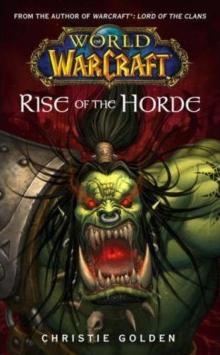 Rise of the Horde
Rise of the Horde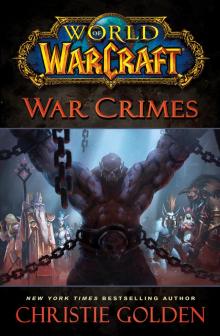 World of Warcraft: War Crimes
World of Warcraft: War Crimes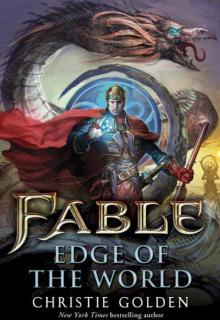 Fable: Edge of the World
Fable: Edge of the World Homecoming
Homecoming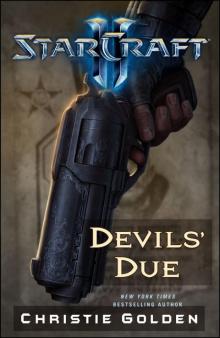 StarCraft II: Devil's Due
StarCraft II: Devil's Due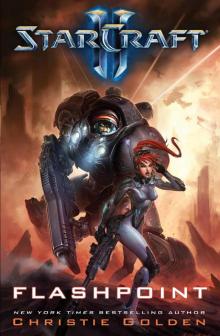 Starcraft II: Flashpoint
Starcraft II: Flashpoint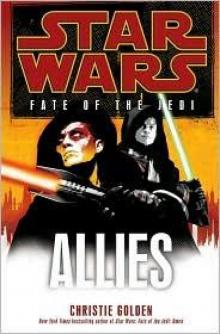 Allies
Allies Shadow Hunters
Shadow Hunters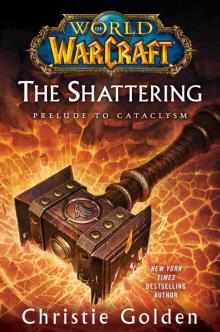 The Shattering: Prelude to Cataclysm wowct-1
The Shattering: Prelude to Cataclysm wowct-1 STAR TREK: VOY - Homecoming, Book Two - The Farther Shore
STAR TREK: VOY - Homecoming, Book Two - The Farther Shore King's Man and Thief
King's Man and Thief In Stone's Clasp
In Stone's Clasp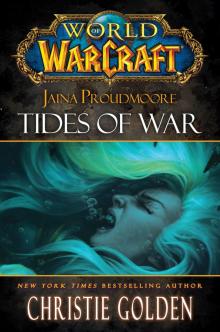 Jaina Proudmoore: Tides of War
Jaina Proudmoore: Tides of War Vampire of the Mists
Vampire of the Mists Star Wars: Fate of the Jedi II: Omen
Star Wars: Fate of the Jedi II: Omen King's man and thief cov-2
King's man and thief cov-2 Star Trek
Star Trek StarCraft: Dark Templar: Twilight
StarCraft: Dark Templar: Twilight Lord Of The Clans
Lord Of The Clans ARKTIKA.1 (Short Story)
ARKTIKA.1 (Short Story)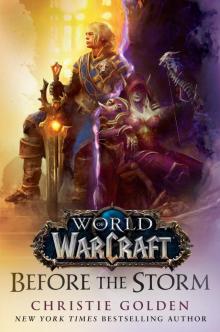 Before the Storm
Before the Storm STAR TREK: VOY - Homecoming, Book One
STAR TREK: VOY - Homecoming, Book One Shadow of Heaven
Shadow of Heaven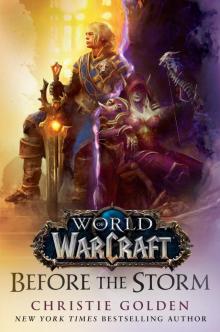 Before the Storm (World of Warcraft)
Before the Storm (World of Warcraft) Warcraft Official Movie Novelization
Warcraft Official Movie Novelization Flashpoint
Flashpoint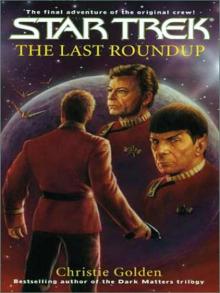 STAR TREK: The Original Series - The Last Roundup
STAR TREK: The Original Series - The Last Roundup On Fire’s Wings
On Fire’s Wings Spirit Walk, Book One
Spirit Walk, Book One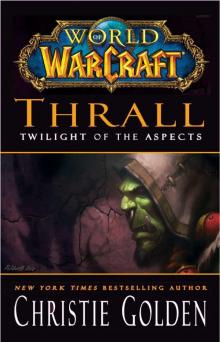 Thrall Twilight of the Aspects
Thrall Twilight of the Aspects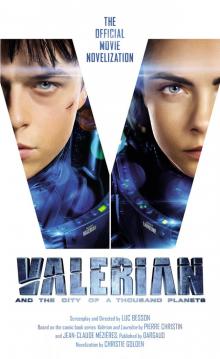 Valerian and the City of a Thousand Planets
Valerian and the City of a Thousand Planets Warcraft
Warcraft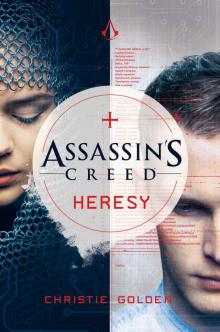 Assassin's Creed: Heresy
Assassin's Creed: Heresy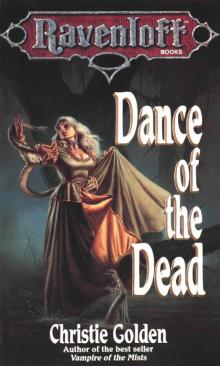 Dance of the Dead
Dance of the Dead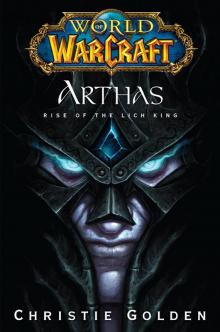 Arthas: Rise of the Lich King wow-6
Arthas: Rise of the Lich King wow-6 Assassin's Creed: The Official Movie Novelization
Assassin's Creed: The Official Movie Novelization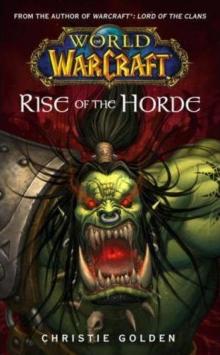 Rise of the Horde wow-2
Rise of the Horde wow-2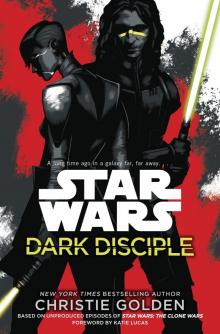 Dark Disciple
Dark Disciple Ghost Dance
Ghost Dance The Shattering
The Shattering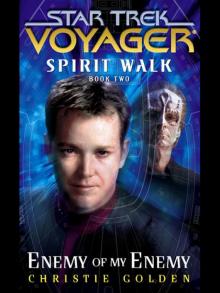 Spirit Walk, Book Two
Spirit Walk, Book Two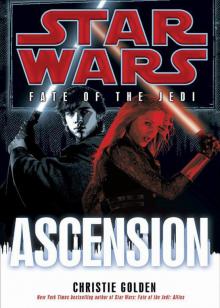 Star Wars: Fate of the Jedi: Ascension
Star Wars: Fate of the Jedi: Ascension Star Wars: Fate of the Jedi V: Allies
Star Wars: Fate of the Jedi V: Allies The Enemy Within
The Enemy Within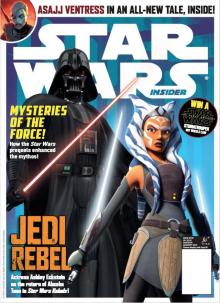 Kindred Spirits
Kindred Spirits The Farther Shore
The Farther Shore Star Trek: Hard Crash (Star Trek: Starfleet Corps of Engineers Book 3)
Star Trek: Hard Crash (Star Trek: Starfleet Corps of Engineers Book 3) Twilight
Twilight